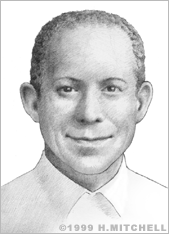William Haseltine
William Haseltine – biophysicist, professor, inventor, and entrepreneur – has been a leader in the international effort to use human genes to battle disease, especially AIDS.
Haseltine went to college at the University of California at Berkeley in the 1960s, where the atmosphere of social revolution was based in a conviction that young people could make the world a better place. After graduating, Haseltine went on to Harvard University, where he earned a PhD in Biophysics. There, he became a founding father of a revolution in medical research: the sequencing of DNA, RNA, and proteins and the use of the human genome to identify and treat diseases.
From 1976 to 1993, Haseltine was a professor at Boston’s Dana Farber Cancer Institute, Harvard Medical School, and the Harvard School of Public Health. His specialties were, and still are, genetics and genomics. Genes, composed of deoxyribonucleic acid (DNA) and found in the chromosomes of all cells, are the key to an organism’s inheritable traits. A genome is the sum total of all the genes contained in an organism’s full set of chromosomes.
The first step in using genes (and the proteins that they encode) for medical purposes is to identify them, which can be done because different genes exist in predictable patterns or sequences (hence the term “sequencing”) along the chromosome. Genes have two major applications once they are identified (or “expressed”). First, expressed genes can be used to diagnose disease. Some genes are simply known to be associated with a given disease. In addition, genes and their proteins whose reaction to a given disease is known can be used as the active component of tests for that disease. Second, genes can be used therapeutically, in a number of ways. One is by removing cells with defective genes from a patient, replacing those genes with healthy ones, and reinjecting the “fortified” cells. Scientists have also developed methods of piggybacking therapeutic genes on an innocuous virus that is injected into a patient’s cells.
Haseltine was at the forefront of such research, which is, of course, still evolving. But he never forgot his Berkeley days and remained greatly concerned with the sociological importance and implications of biological research. He developed and taught a course on the subject for Harvard’s non-science concentrators. At school and in public, Haseltine was also an early crusader of AIDS awareness. For example, he was among the first to lobby for public funds to be devoted to AIDS research.
Since 1982, Haseltine has founded at least seven biotech companies, each with a distinct medical specialty, and has helped others to found more than twenty other firms. He also advises many charitable research organizations. In 1992, Haseltine founded Human Genome Sciences, Inc. (HGS), based in Rockville, Maryland. There, he oversaw the creation of an entire encyclopedia of expressed human genes, which already includes over half a billion distinct sequences. Haseltine also directed therapeutic research, especially in the fight against AIDS. He retired from HGS in 2004, and the company was purchased by GlaxoSmithKline in 2012.
William Haseltine holds over 50 patents. As Haseltine points out, patents not only grant rights to the holder, they also guarantee the dissemination of information to the public. Thus, his patents are complementary to the over 250 scientific articles he has written. Haseltine has also won numerous awards as a scientist and businessman, including Ernst & Young’s Greater Washington Area Entrepreneur of the Year in 1996. Since his retirement in 2004, Haseltine has founded two charitable foundations: The Foundation for Science and the Arts and ACCESS Health International.


